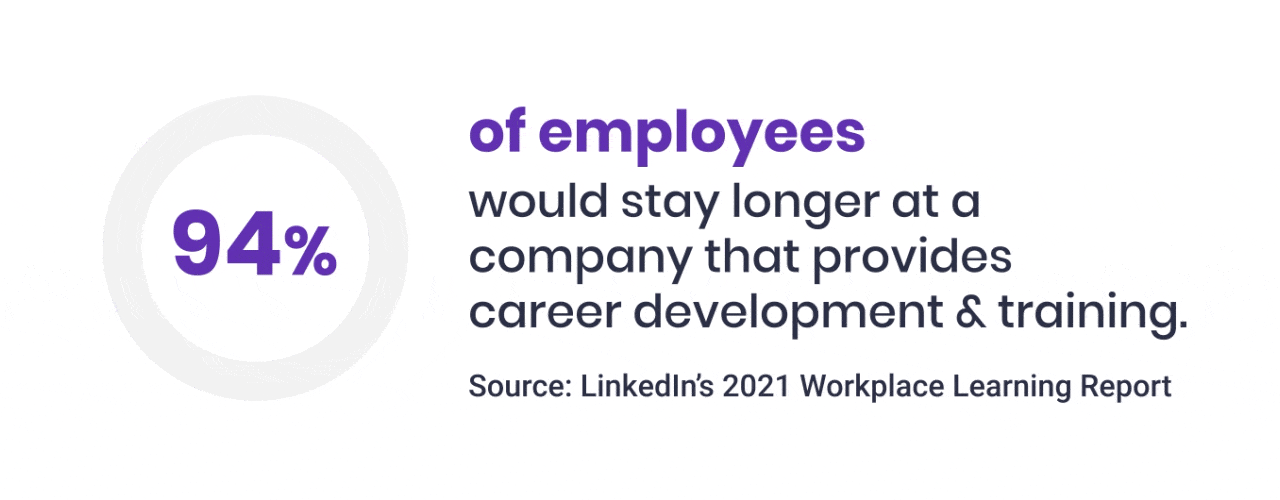According to the U.S. Bureau of Labor Statistics, 4 million people quit their jobs in July 2021. Resignations are on the rise, leading to a record 10.9 million open jobs at the end of July and a continued wave of resignations through the end of the year.
This is largely due to remote work burnout leading to employee disengagement. Companies spend a lot of time and resources searching for and hiring employees, especially in mid- to high-level roles, with the goal of keeping them around. In addition, it can cost twice the annual salary of an employee to replace them, according to Gallup estimates.
Understanding why employees become disengaged and why they leave is of utmost importance in the midst of the Great Resignation. With these insights, managers can overcome disengagement and attrition to attract and retain top talent that’s a powerhouse for profitability and productivity.
Why Managers Play a Critical Role in Engagement & Retention
According to Gallup’s State of the American Manager: Analytics and Advice for Leaders, managers account for at least 70 percent of the variance in employee engagement. This variation may be responsible for the low employee engagement worldwide.
Great managers consistently engage their teams and inspire them to perform well. They create environments of accountability and build profitable and productive workplaces. Managers are also the conduit to work assignments, new opportunities, and communication lines.
If a manager is ineffective in communicating to employees, overseeing tasks, and finding opportunities for advancement in their teams, they can’t inspire engagement or longevity from their teams. Inconsistent and vague communication and poor project or task management fail to set clear expectations and accountability for employees, giving them little motivation to try harder in their roles or in reaching the company’s or their personal goals.
The manager plays a vital role in the employee’s career and their future success and growth. And yet, year after year, Gallup tells us that the majority of resignations are due to poor managers. It’s clear, without an effective manager, an employee may not receive the guidance, feedback, and opportunities necessary to fuel their growth and development, prompting them to find opportunities elsewhere.
Strategies for Managers to Overcome Disengagement and Attrition
Deliver Effective and Timely Communication
It’s one thing for a manager to communicate, entirely something else to communicate effectively. Effective communication skills are essential in any work environment, perhaps more so between a manager and their direct reports. Without clear and concise direction, employees can become disengaged and unproductive. This makes sense when you consider that manager communication directs most everything an employee does throughout their day.
In an effort to communicate more effectively, managers should prioritize transparency and honesty. These two traits fuel the trust that’s required for strong manager/employee relationships. Transparency in action looks like a manager who is authentic and genuine with their words and behaviors. Honesty in action sounds like a manager who shares the truth to the extent it is appropriate. Managers who practice transparency and honesty develop stronger communication channels with their employees.
Conversations should also take place in a timely manner. If you’re working with a virtually remote or hybrid team, the communication tendency might be “out of sight, out of mind.” Now more than ever, being timely with responses, guidance, and feedback should be a manager’s number one priority.
Foster Connection with Boss and Teammates
Remote and hybrid work has left a lot of workplaces filled with employees who feel disconnected. Isolation over long periods of time is a detriment to team camaraderie and productivity.
A great way to foster connection with employees is through one-on-one coaching, regular check-ins and positive conversations. Many employees are eager for performance feedback and clear expectations, yet with remote locations and the day-to-day bustle of work, they may not receive it.
Connection can be as simple as a daily text to say hello, a smile and uplifting demeanor on video calls, or a word or two of encouragement. Managers have a big responsibility when it comes to helping their team feel connected to the work as well as one another.
Cognizance of Adding Variety and Challenge
Employees who are bored in their roles and do the same thing day in and day out are prone to burnout and attrition. Nothing beats monotony and boredom like adding variety or challenge into a workday that feels routine. Mixing things up helps employees stay interested, motivated, and excited in an otherwise familiar work environment.
What could a few shifts or changes look like on a team? Managers can think of fun and different ways to delight and surprise their teams, all with the goal of spicing up what may feel ordinary. For example, scheduling team meetings for 25 or 50 minutes vs. the conventional half hour and hour meetings; hosting a silly themed meeting like “Tie Friday” where everyone wears a tie or “Monday NFL” where employees don their favorite team jersey; or announcing a challenge to brainstorm on a new client initiative.
By adding something different to a team’s workday, a manager can serve to shift folks out of autopilot and what may feel rote after these few years of remote and isolated lives.
Strategic Use of Training and Development
A lack of career growth and development is one of the main drivers behind employee resignations, according to Gallup’s State of the American Workplace report. And based on LinkedIn’s 2021 Workplace Learning Report, 94 percent of employees would stay longer at a company that provides career development and training.
Companies both large and small should take the opportunity to promote employee growth opportunities with training and development programs. Despite being short staffed, under-resourced or without proper budget, a company that aspires to greater levels of success must understand how that success is directly related to employee development. Plus, employees who can link their goals to larger organizational goals are more likely to be engaged and invested in the company’s success.
Training doesn’t have to be expensive and large-scale to be impactful. Employees at all levels can benefit from both formal education and training opportunities as well as low-cost/no-cost internal initiatives (think lunch and learns and mentor partnerships). The whole team, including managers and teams, should be involved in discussions about training programs, skills gaps, and opportunities for employee development in strategic areas that further the company’s goals.
Genuine and Frequent Appreciation and Recognition
As we all are aware, employee appreciation and recognition are vital to effective management, especially as the competition for talent and resignations increase. Yet, resigning employees will often cite a lack of appreciation as a reason they are leaving.
A recognition program doesn’t always have to be monetary and in the form of bonuses and incentives – positive verbal feedback and small gestures can go a long way.
If there isn’t a budget for raises or bonuses, consider offering unique training opportunities, gift cards, company-branded gifts, or other personal touches to recognize an employee going above and beyond, reaching an important milestone, or showing exceptional performance. Even a meaningful text or email sent at the right time can be impactful.
Managers Hold the Key to Employee Retention in the Great Resignation
Talented managers are essential to any organization, especially when employees are leaving their jobs in stunning volumes in search of better opportunities with different companies. With the right strategies in place, companies can inspire their managers and engage their employees to improve retention and reduce attrition.
Contact us to learn how Mediafly’s sales enablement platform can help you effectively coach and manage your revenue teams for mutual success.



Comments are closed.